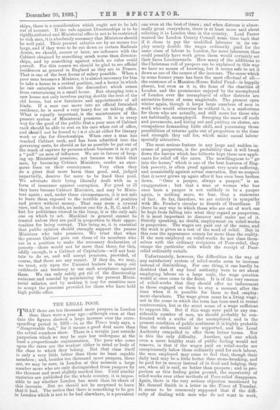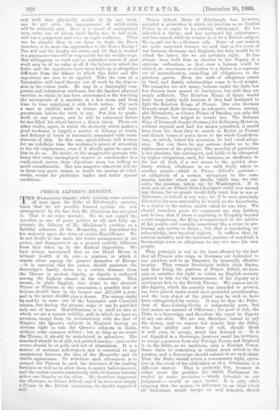THE LEGAL POOR.
sible to say whether London has more than its share of this increase. But we should not be surprised to learn that it had. The notion that there is something to be got in London which is not to be had elsewhere, is a prevalent one even at the best of times ; and when distress is abnor- mally great everywhere, there is at least more said about relieving it in London than in the country. Lord Ferrer warned the London County Council some time back that if it chose to pay the unskilled labourer in its em- ploy nearly double the wages ordinarily paid for the same class of labour in London, far more labourers than could possibly have work given them would certainly set their faces Londonwards. How many of the additions to the Christmas roll of paupers can be explained in this way we have no means of knowing, but it seems safe to set it down as one of the causes of the increase. The cause which in some former years has been the most effectual of all— the existence of a Mansion-House Relief Fund—is happily absent, but even as it is, the fame of the charities of London and the prominence enjoyed by the unemployed of London over the unemployed of other districts are attractive forces of some magnitude. The present open winter again, though it keeps large numbers of men in work who would otherwise be without it, is a misfortune for those who are actually, and still more for those who are habitually, unemployed. Sweeping the snow off roofs and pavements, and hiring out and putting on skates, are occupations demanding little skill, and possessing those possibilities of returns quite out of proportion to the time and strength they call for, which make casual labour specially attractive.
The most serious feature in any large and sudden in- crease of pauperism, is the probability that it will break down the barrier which has hitherto kept these new appli- cants for relief off the rates. The unwillingness to " go into the house," which is one of the best features of Eng- lish poverty, is often proof against very acute suffering, and occasionally against actual starvation. But we suspect that it never grows up again after it has once been broken down. " Once a. pauper, always a pauper," is an exaggeration ; but that a man or woman who has once been a pauper is not unlikely to be a pauper again, is nothing more, we fear, than a statement of fact. So far, therefore, we are entirely in sympathy with Mr. Fowler's circular to Boards of Guardians. If there be any way in which those who are out of work can be kept from falling into what they regard as pauperism, it is most important to discover and make use of it. Strictly speaking, no doubt, employment on relief-works is pauperism. The wages are paid out of the rates, and the work is given as a test of the need of relief. But in this case the appearance counts for more than the reality. If the men employed on relief-works do not class them- selves with the ordinary recipients of Poor-relief, they escape the particular evils which the receipt of Poor- relief ordinarily entails.
Unfortunately, however, the difficulties in the way of any satisfactory system of relief-works seem to increase instead of diminishing. For one thing, it can hardly be doubted that if any local authority were to set about employing labour on a large scale, the wage question would as once come to the front. It is of the very essence of relief-works that they should offer no inducement to those engaged on them to stay a moment after the time when it is possible for them to find employ- ment elsewhere. The wage given must be a living wage ; not in the sense in which the term has been used in recent controversies, but in the strict sense of a wage sufficient to support life. But if this wage were paid to any con- siderable number of men, we should probably be con- fronted with a strike of the unemployed, and in the present condition of public sentiment it is highly probable that the strikers would be supported, and the Local Authority compelled to offer them better terms. Nor is this the only difficulty. Another, and one which even a more healthy state of public feeling would not remove, is that if the wages paid on relief-works are conspicuously below those ordinarily paid for such labour, the men employed may come to feel that, though their daily task may be a little better than stone-breaking, and be paid for in money instead of in food and lodging, they are, when all is said, no better than paupers ; and in pro- portion as this feeling gains ground, the superiority of relief-works over other methods of Poor-relief disappears. Again, there is the very serious objection mentioned by Mr. Samuel Smith in a, letter in the Times of Tuesday. It seems to be commonly supposed that if the diffi- culty of dealing with men who do not want to work, and with men physically unable to do any work, can be got over, the management of relief-works will be perfectly easy. Here is a crowd of unemployed men, every one of whom, until lately, was in full work, and was a competent and even an eager workman. What can be simpler than to set them to drain the Essex marshes, or to make the approaches to the Tower Bridge ? The will and the faculty are there, and all that is wanted is a paymaster who will be responsible for the weekly wage. But willingness to work and an unbroken record of past work may be of no value at all if the labour in which the habit and the experience have been built up is altogether different from the labour to which this habit and this experience are now to be applied. Take the case of a Lancashire mill-hand thrown out of work by the depres- sion in the cotton trade. He may be a thoroughly com- petent and industrious workman, but the hardest physical exertion to which be has been accustomed is the watching the movements of a machine in a hot room and from time to time supplying it with fresh cotton. Put such a. man to outdoor work in winter, and he will have pneumonia before the week is out. Put him to spade- work at any season, and he will be exhausted before he has filled his wheel-barrow a dozen times. There are other trades, again, in which the dexterity which makes a good workman is largely a matter of delicacy of touch, and delicacy of touch is intimately associated with sensi- tiveness of skin. In this case, spade-labour will destroy for an indefinite time the workman's power of returning to his old employment, even if it should again be open to him to do so. No doubt, to the' maginative persons who fancy that every unemployed weaver or watchmaker is a ready-made navvy, these objections seem too trifling to merit consideration. But less sanguine observers will see in them very grave reason to doubt the success of relief- works, except for particular trades and under special conditions.



































 Previous page
Previous page